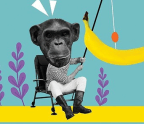
Crisp, cold, winter air. Plenty of snow for skiing. Chills give thrills—but beyond a point, they kill. Low temperatures make cells—the building blocks of all living creatures—behave sluggishly. Molecules like proteins lose their shapes. The chemical reactions that convert food to energy grind to a halt. The worst, though, occurs below 32 degrees Fahrenheit (0 degrees Celsius). That’s where water freezes, forming ice crystals around cells and organs. The crystals damage the organs to rupture, too.






